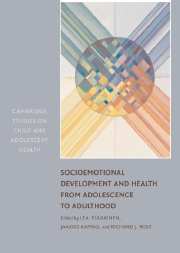Book contents
- Frontmatter
- Contents
- List of Contributors
- Preface
- Introduction
- PART I LONGITUDINAL AND BEHAVIORAL GENETIC APPROACHES
- 1 The Jyväskylä Longitudinal Study of Personality and Social Development (JYLS)
- 2 Genetic and Environmental Influences on Social Behavior and Health
- 3 Social Behaviors and Health in Twins: The FinnTwin Studies
- PART II ADOLESCENT HEALTH-RELATED BEHAVIOR AND ADULT HEALTH
- PART III SOCIOEMOTIONAL BEHAVIOR IN EARLY ADOLESCENCE
- PART IV LIFE COURSE AND HEALTH
- Summary and Future Directions
- References
- Author Index
- Subject Index
1 - The Jyväskylä Longitudinal Study of Personality and Social Development (JYLS)
Published online by Cambridge University Press: 07 December 2009
- Frontmatter
- Contents
- List of Contributors
- Preface
- Introduction
- PART I LONGITUDINAL AND BEHAVIORAL GENETIC APPROACHES
- 1 The Jyväskylä Longitudinal Study of Personality and Social Development (JYLS)
- 2 Genetic and Environmental Influences on Social Behavior and Health
- 3 Social Behaviors and Health in Twins: The FinnTwin Studies
- PART II ADOLESCENT HEALTH-RELATED BEHAVIOR AND ADULT HEALTH
- PART III SOCIOEMOTIONAL BEHAVIOR IN EARLY ADOLESCENCE
- PART IV LIFE COURSE AND HEALTH
- Summary and Future Directions
- References
- Author Index
- Subject Index
Summary
The Jyväskylä Longitudinal Study of Personality and Social Development is an ongoing long-term study that began in 1968. From the very beginning, data have been collected within a framework of emotional and behavioral regulation. This chapter presents the framework model and its theoretical rationales. Data collection waves are described, first, from childhood to adolescence, and second, in adulthood. Results on continuity in socioemotional behavior and its developmental background, problem behavior and health, and positive development are presented so as not to overlap with results in the other chapters of this book.
INTRODUCTION
The title of the Jyväskylä Longitudinal Study of Personality and Social Development (JYLS) specifies the concepts of personality and social development. One way to make a distinction between personality and social development is to limit the questions of personality structure, traits, and identity to the personality domain, and those of social relationships, role achievements, and dimensions of interpersonal behavior, such as prosocial and antisocial behavior, to the social domain. Personality development concerns the process of individuation for a unique personality, whereas social development concerns the process of socialization into a society. As noted by Masten and Coatsworth (1995), “Human individuals, as living organisms, must maintain coherence and organization as a unit, while they interact with the environment, including other individuals, and also function as part of larger systems” (p. 715).
- Type
- Chapter
- Information
- Publisher: Cambridge University PressPrint publication year: 2006
- 34
- Cited by



